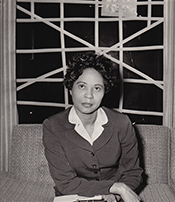|
Review of Passionate Politics: The Life and Times of Charlotte Bunch An Interview with Sharon La Cruise Review of Daisy Bates: First Lady of Little Rock |
||||
 |
||||
Daisy Bates. Image courtesy of Gertrude Samuels Collection. |
||||
Journal Issue 4.2
An Interview with Sharon La Cruise
Interview by Anne Keefe
SLC: I would also love for the film to be used for leadership, to also encourage young girls to step up, because in the end Daisy Bates was just an ordinary woman, and probably much less educated than many of the people who are going to be watching the film. So she really does give you a sense of, if you're determined and if you're focused, and if you actually care about something, that you could actually get stuff done, and you should become more active in the community. And on a historical level, I would love to see her get her place in history books, because up until this time, no historian has written a book on her. She does not have a biographer who is a historian. Her biographer is lawyer. And that's two different disciplines. There's nothing wrong with his biography, but I want to see a scholar to put her in her place because until a scholar writes about her, she will not really get her place in history books. The scholars really help determine that. And other scholars will pick up from that, but so far nobody stepped up yet.
AK: Maybe the film will inspire that.
SLC: I keep hoping a scholar will see it and say, "I want to find out more about her on my own" and start digging and digging. And I would love to meet that person and help them on that journey, because I want someone to write a scholarly book about her and her place in the movement, and have people know her outside of Arkansas and know what she did. And even within Arkansas when they watch the film they're like blown away because they realize they didn't know a lot about her. They really know just the basics. So they learned a lot from the film as well. That scholarly research into her life would be my dream for her.
AK: There's another level to what your film does: it gives a model to students for moving from that spark of curiosity into a long-term research project. I love that you include yourself in the film; you include the letter you write, you include yourself looking at the microfilm, and you show your actual research happening. And that's great for students to see.
SLC: I didn't set out to do that kind of film, because I was kind of doing the films I was used to. I had no plans to be on camera, but we made the film one way, and we realized it was kind of flat. It was too dry, and it was like the voice-of-God narrator in it. We realized maybe it would be more interesting if I took you on this journey with me as I try to unravel who she is and what happened to her in her life and why she got lost in the history. And I'm really happy that worked out well, because I didn't plan it.
For discussion and educator guides on the film Daisy Bates: First Lady of Little Rock, visit ITVS here.
Copyright © 2014. All rights reserved.